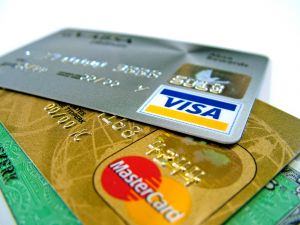With so much discussion about the perils of predatory lending and credit card debt, the idea of starting to establish your credit can be very intimidating. The importance of managing your finances is evident in every aspect of your life; financing a home, buying a car and applying for student loans are all closely tied to your credit standing. Opening up your first credit account is a major milestone in your life as an adult. This article outlines some of the most important things to consider as you consider applying for a credit card.
What to Consider When Applying for a Credit Card
 If a credit card company offers you a credit line that seems unreasonably generous, think twice before accepting. Some lenders allow you to request a lowered credit limit after you’ve accepted the original terms, but this may adversely impact your tenuous credit rating. If you’ve never worked or had access to a bank account, the prospect of access to even a $1,000 credit line may be absolutely intoxicating; you may be tempted to splurge on a pricey piece of clothing or book a trip. Before you go wild, understand that a credit line is not the same as free money. You are obligated to pay the money back, often with interest. Choose wisely and think hard before using a card to make a major purchase.
If a credit card company offers you a credit line that seems unreasonably generous, think twice before accepting. Some lenders allow you to request a lowered credit limit after you’ve accepted the original terms, but this may adversely impact your tenuous credit rating. If you’ve never worked or had access to a bank account, the prospect of access to even a $1,000 credit line may be absolutely intoxicating; you may be tempted to splurge on a pricey piece of clothing or book a trip. Before you go wild, understand that a credit line is not the same as free money. You are obligated to pay the money back, often with interest. Choose wisely and think hard before using a card to make a major purchase.
If your motivation for opening a credit account is focused on building good credit, you probably shouldn’t bother with rewards programs and point systems. These features often carry monthly or yearly fees to participate. However, if you plan to charge most of your purchases and pay your bill in full every month, rewards programs may be worth your attention. Some lenders offer incentives in the form of airline miles, gift cards, merchandise or cash back. Other lenders contribute a set amount to a college savings plan every time you make a purchase. Explore your options and don’t hesitate to ask questions about different programs and terms.
It seems simple enough to remember which day of the month your payment is due, but sometimes life gets a bit hectic without warning. With this in mind, you should look for a credit card company that offers payment options that work well for you and your schedule. For example, most companies allow you to schedule automatic payments from your checking account; others only send paper statements in the mail. It’s not uncommon for due dates to fall on the first day of the month, which may drain your checking account. Fortunately, many credit card companies allow you to choose the monthly payment date to help avoid this type of situation.
At first sight, the terms of most credit card agreements seem reasonable enough. However, many people have been horrified to discover that even the slightest slip-up with payments can result in hefty fees and penalties. It is not uncommon for lenders to charge as much as $25 for each day your payment is late; others tack on fines for each transaction that exceeds your credit limit. Some companies will waive a late charge once, but beyond that there is very little leeway.
Whether you are applying for your first credit card or are trying to rebuild your credit after a major financial misstep, there are many things you can do to get started. The ideas in this article should make it easier for you to make responsible, reasonable decisions as you work toward your goals. Your credit rating can have a major impact on your quality of life, so never miss out on an opportunity to learn more about managing your personal finances.
